Costa Rica Culture: Pura Vida Defines Us
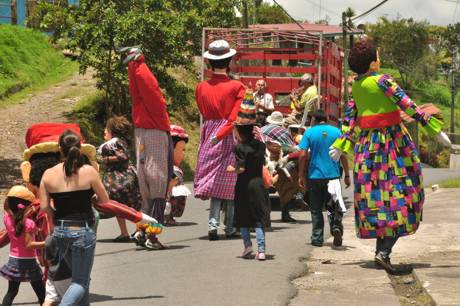
Serendipity guides will go out of the way to encounter local celebrations, from the Giant Parade of Santa Cruz to sand painting streets in Capellades or a horse dance or oxcart parade.
Costa Rica Celebrates Old Traditions in the Campo
Costa Rica is still mainly a rural, agrarian society, with family farms and small towns and where the Catholic Church centers life. While the country people are personally conservative, they spare no craziness in celebrating old traditions - like hundreds of horses dancing through the center of town (not a joke -- they dance to the music). Roads close with no detour signs for a comparsa dance, drums and coaches' whistles and row dancing with intricate foot and arm movements, from 3 year olds to 90 year olds.
Perhaps Costa Rica's greatest gift to the world is the happiness our people share within their families and to outsiders as well. There's a strong bond between grandparents and youngsters that lasts throughout time. It is one part being Latino, and one part being in a country with a secure, healthy people and reverence for social graces.
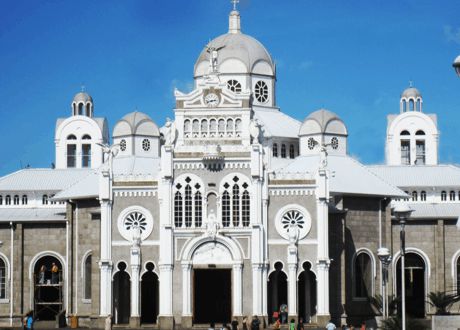
The most important church in Costa Rica, the basilica de la Negrita is filled with votives and gifts of hand-carved and hand-sewn or painted offerings, and well worth stopping for a view inside
Costa Rica's Pacifist History
After our civil war in 1948 Costa Rica eliminated the military. Military money went instead to create a safe, healthy country, investing in education, heath care, clean water and electricity for every citizen, rich and poor alike.
While there are certainly wealthy people and families in Costa Rica, there are no "oligarchs". Elections are free and candidates campaign vigorously. Small political parties create coalitions to have a stronger voice. Presidents can serve only one term and must step down for at least a term, and the leadership party frequently changes.
Costa Rica has a truly free press.
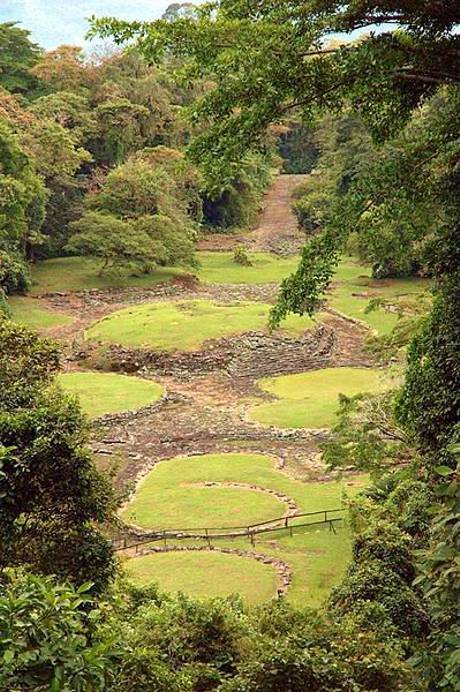
Guayabo ruins, near Turrialba, are the only Pre-Columbian ruins in Costa Rica open to the public
Ancient Costa Rica: Pre-Columbian Ruins and Museums
Unlike Aztec, Mayan and Inca civilizations, Costa Rica's indigenous were extremely isolated and still remain an archaeological curiosity. Costa Rica was never a hot spot for Spanish conquest because the natives had nothing of precious metals that interested the Spanish. That turned out to be a great blessing for our country, growing up without Spanish hegemony and wealth extraction.
In San José the Gold Museum displays relics found in Costa Rica lost during shipment to Spain. The treasures from the Incas were carried from Peru by Spanish ships on the Pacific side to the north to the Pacific coast of Costa Rica. The artifacts and gold then made the crossing by land to the Atlantic and onto ships bound for Spain.
Most rural churches in Costa Rica are open for visitors of any faith. While officially Catholic, Costa Rica has religious freedom, and there are congregations of nearly every faith somewhere in Costa Rica.
Our Living Culture
(Mouse over for larger image)
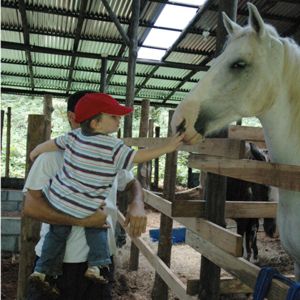
 Children start young to make friends with animals, and have confidence for a lifetime
Children start young to make friends with animals, and have confidence for a lifetime
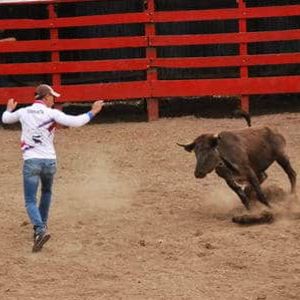
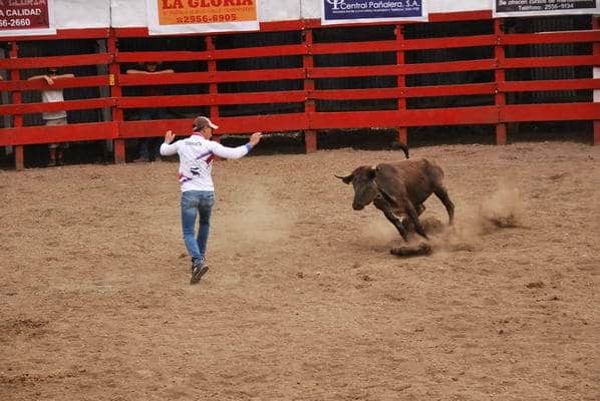 Costa Rica bullfight rules: No weapons, only hands and optional flags or capes. On the other side: the Bulls have no rules.
Costa Rica bullfight rules: No weapons, only hands and optional flags or capes. On the other side: the Bulls have no rules.
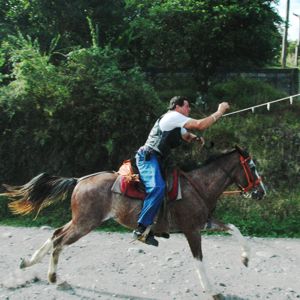
 Traditional "Cinta" race - full gallop, pass dart through paper clip hanging on "cinta" (tape). Here is Serendipity mechanic Marvin going for the Gold.
Traditional "Cinta" race - full gallop, pass dart through paper clip hanging on "cinta" (tape). Here is Serendipity mechanic Marvin going for the Gold.
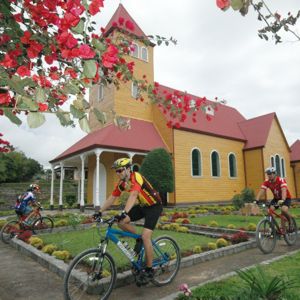
 Country church with tin-plated walls on the route of a Serendipity Costa Rica day on bikes
Country church with tin-plated walls on the route of a Serendipity Costa Rica day on bikes
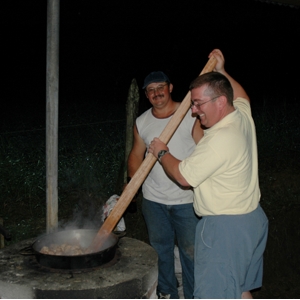
 Costa Rica country tradition- Serendipity guest helps out cooking Chicharrones over wood fire
Costa Rica country tradition- Serendipity guest helps out cooking Chicharrones over wood fire
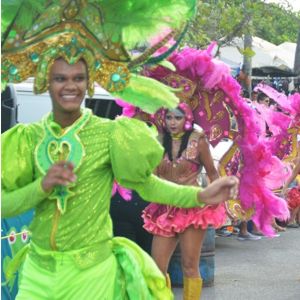
 Comparsa Dancing, almost every small town has one - colorful, loud, and fun to watch -- or join in
Comparsa Dancing, almost every small town has one - colorful, loud, and fun to watch -- or join in
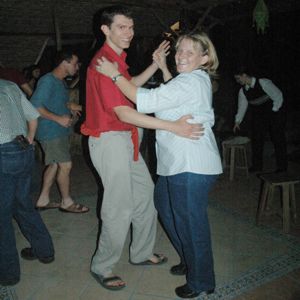
 Latin dancing - Serendipity guides and guests have fun at a local cantina. The samba, rumba and meringue are quick to learn
Latin dancing - Serendipity guides and guests have fun at a local cantina. The samba, rumba and meringue are quick to learn
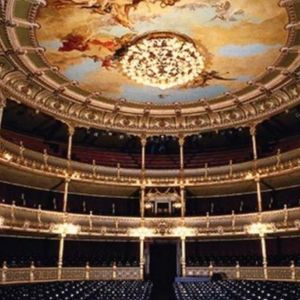
 The National Theater in San José was finished in 1892, built by the coffee barons. The theater is exquisitely maintained and used daily for the National Orchestra and many live theater productions.
The National Theater in San José was finished in 1892, built by the coffee barons. The theater is exquisitely maintained and used daily for the National Orchestra and many live theater productions.
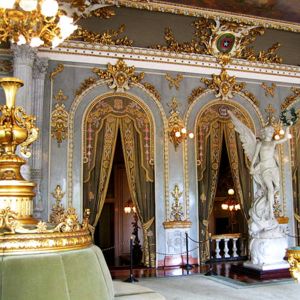
 All the elegance of European palaces, inside the Costa Rica National Theater, built in 1894
All the elegance of European palaces, inside the Costa Rica National Theater, built in 1894
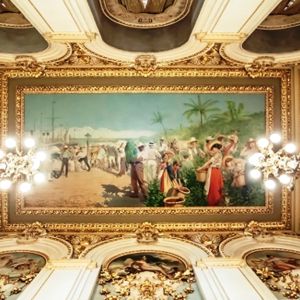
 The ceiling in the National Theater depicts coffee and sugar harvest. This painting was reproduced on the original printed 5 colones money note.
The ceiling in the National Theater depicts coffee and sugar harvest. This painting was reproduced on the original printed 5 colones money note.
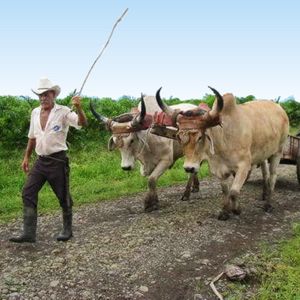
 Olvideo hauls sugar cane with his oxcart, still used in small farms in Costa Rica
Olvideo hauls sugar cane with his oxcart, still used in small farms in Costa Rica
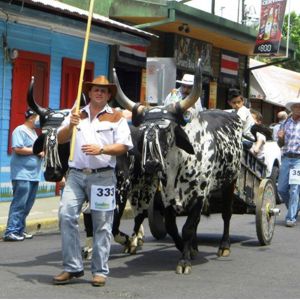
 Costa Rica oxcart parade. Many coffee towns have oxcart celebrations, and when we can, Serendipity will get you there to be part of the fun.
Costa Rica oxcart parade. Many coffee towns have oxcart celebrations, and when we can, Serendipity will get you there to be part of the fun.
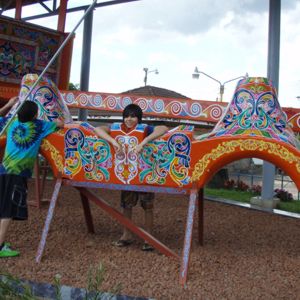
 Traditional painting in intricate design on massive oxcart yoke. While it started with oxcarts and yokes, it has grown into many wooden items with colorful geometric patterns. You can buy everything from an oxcart (if you have a few oxen at home to harness) to a salt shaker.
Traditional painting in intricate design on massive oxcart yoke. While it started with oxcarts and yokes, it has grown into many wooden items with colorful geometric patterns. You can buy everything from an oxcart (if you have a few oxen at home to harness) to a salt shaker.
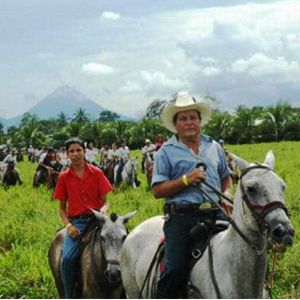
 Traditional horseback celebration: Almost every weekend we can find a Cabalgata, with hundreds of horses riding cross-country, ending with traditional food, too much beer and the whole family joins in.
Traditional horseback celebration: Almost every weekend we can find a Cabalgata, with hundreds of horses riding cross-country, ending with traditional food, too much beer and the whole family joins in.
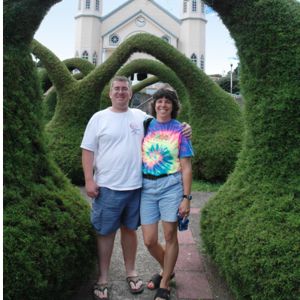
 Topiary fantasies - the community prunes the cedar trees into imaginary creatures. Zarcero is our favorite.
Topiary fantasies - the community prunes the cedar trees into imaginary creatures. Zarcero is our favorite.
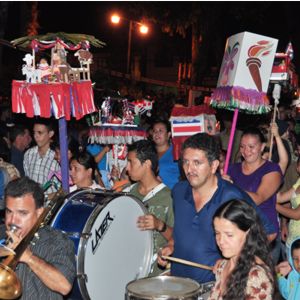
 Faroles (Independence day) parades are often at night.
Faroles (Independence day) parades are often at night.
It's time to call us.
